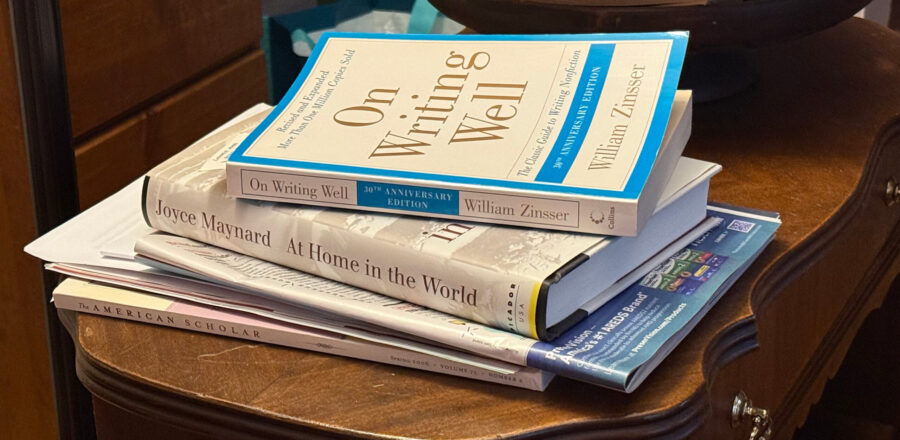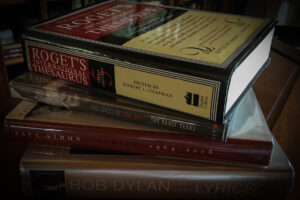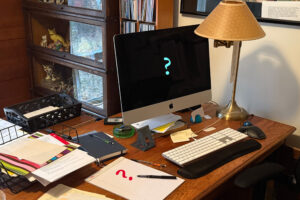In November 2022, I wrote a blog, Too Many Books? The essay ponders the question of whether or not one can own too many books. Here is one thought from that essay:
Too many books? Even if we never read them all? When I look at them on the shelves and sometimes take one down to read a chapter or two . . . it always reminds me that there is so much knowledge in the world—more than I can ever know or comprehend. It puts me in my place. It inspires me to think deeper and to realize my viewpoint or opinion is not the only one . . . and, I might be wrong about something.

I have struggled throughout my life to read books. By that I mean, to consistently and regularly sit down and read . . . and, to read a book from start to finish. In 2024, I embarked on a goal of reading a book a month. I stumbled on this quite by accident.
My husband and I often buy books that look interesting. There had been one on my husband’s nightstand for months. It was written by Adam Savage. You may know him from the Discovery Channel TV series MythBusters. Adam is a maker. He is a special effects designer and fabricator, actor, educator, television personality, and producer. His model work has appeared in major films, including Star Wars: Episode II – Attack of the Clones and The Matrix Reloaded.

We enjoy watching his YouTube channel and are fascinated with his ability to discuss the various aspects of being a maker—such as organization, thought processes, and problem solving. After eyeing the book on the nightstand for months, I finally decided I would go ahead and read it first and not wait on my husband.
He happened to have several doctor appointments in January which I drove him to—so I grabbed the book and read it as I sat waiting on him during the appointments. I had so much time to read that I finished the book. It inspired me to pick up another book and begin reading. I decided my goal would be to read one a month. Surely, I could make it through eleven more? I knew to succeed that I would need to consciously set aside the time.
January 2024
Favorite quotes from: Every Tool’s a Hammer: Life Is What You Make It by Adam Savage
“It merely requires that you participate in your world, that you pay attention to what interests you, that you follow the thrills they produce, and that you never be afraid to go deep on them, to obsess over them, to dig through the bottom of the rabbit hole, if necessary, to find that great idea that has been waiting there for you all along.”
“When your project feels like a lion that needs to be tamed, a comprehensive checklist can be both the whip and the chair.”
“Every shop, in this sense, is an individual philosophical discourse about how to work, one held up by personal beliefs that, like anything, evolve with time and experience and wisdom, but are always a reflection of you . . . Do I like it calm or crazy? . . . the maker’s own evolution is always forward . . .”
February 2024
Favorite quotes from: Saved by a Song: The Art and Healing Power of Songwriting by Mary Gauthier
I met Mary at a songwriting workshop in Nashville—she was one of the teachers. Her passion about songwriting and about life profoundly affected me.
“. . . I’ve yet to meet a single one called to songwriting by mistake. The calling knows what it is doing when it taps someone on the shoulder and whispers, “Write.””
“People ask me if I believe songs can change the world. My answer is yes, absolutely. Here’s how: A song can change a heart by creating empathy. A changed heart has the power to change a mind. And when a mind changes, a person changes. When people change, the world changes. One song, one heart, one mind, one person at a time.”
“The deeply personal is what connects each of us to the universal.”
March 2024
Favorite quotes from: Kitchen Confidential: Adventures in the Culinary Underbelly by Anthony Bourdain
I had a bookmark about a quarter of the way into this book because I had previously started it at least four times. I started over . . . again. Bourdain was a fascinating person—passionate about food, people, and life. In 2021, I wrote a blog about him. (Simple Food)
“My first indication that food was something other than a substance one stuffed in one’s face when hungry—like filling up at a gas station—came after the fourth grade . . . It was the soup. It was cold . . . Vichyssoise . . . came the reply . . .”
“And I had my first oyster. Now, this was a truly significant event. I remember it like I remember losing my virginity—and in many ways, more fondly.”
What happened in the rest of 2024?
I got stuck reading the Bourdain book. Knowing how his story ended made it difficult to read—especially his episodes of depression. I was able to trudge through those parts and yet . . . the descriptive narratives about the characters in New York restaurants were also upsetting. I could not read much at a time. I finished it in March 2025—just so I could finally begin reading another book. I guess the subtitle should have given me a clue about the content — “the Culinary Underbelly.”
What happened? What went wrong with my reading plans? I failed to follow my advice—to consciously set aside time to read. I found it easy when there was plenty of time—when I had nothing else to do. However, when my days were scheduled with regular routines, I failed to make reading a priority.
Why is reading important?
Reading allows us to explore different ideas and perspectives—to see the world through another’s eyes—to understand other people and situations. Reading expands our horizons, sparks creativity, and feeds our imagination.
Life of intention
Will I read more this year? Judging from the past, I will not. However, I am a person who is crazily optimistic. I began the year (2025) with renewed enthusiasm. I found a journaling method which keeps me focused on what is important. Each week I decide what actions support who I will be in the present—which activities support my intentions. This requires work and self-reflection—tracking my daily activities, writing down my monthly intentions, and marking if I followed through. I have found this helpful. I will share more about this in another blog.
What am I reading now? Two books that I have read before—but are worth rereading. On Writing Well by William Zinsser and At Home in the World: a memoir by Joyce Maynard.
Quotes about reading
Reading is the sole means by which we slip, involuntarily, often helplessly, into another’s skin, another’s voice, another’s soul.
— Joyce Carol Oates (b. 1938) American writer
A mind needs books as a sword needs a whetstone, if it is to keep its edge.
— George R. R. Martin (b. 1948) American author, television writer, and television producer
It is what you read when you don’t have to that determines what you will be when you can’t help it.
— Oscar Wilde (1854-1900) Irish author, poet, and playwright
Books are a uniquely portable magic.
— Stephen King (b. 1947) American author
In the case of good books, the point is not to see how many of them you can get through, but rather how many can get through to you.
— Mortimer J. Adler (1902-2001) American philosopher, educator, encyclopedist, author, and lay theologian
A book is made from a tree. It is an assemblage of flat, flexible parts (still called “leaves”) imprinted with dark pigmented squiggles. One glance at it and you hear the voice of another person, perhaps someone dead for thousands of years. Across the millennia, the author is speaking, clearly and silently, inside your head, directly to you. Writing is perhaps the greatest of human inventions, binding together people, citizens of distant epochs, who never knew one another. Books break the shackles of time ― proof that humans can work magic.
— Carl Sagan (1934-1996) American astronomer, planetary scientist, and science communicator











Leave a Reply
Your email is safe with us.